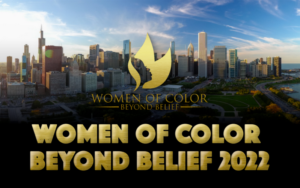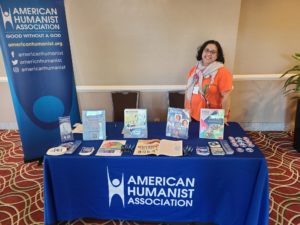Humanist Women of Color Gather

The Women of Color Beyond Belief (WOCBB) conference, presented by Black Nonbelievers, Black Skeptics Group, and the Women’s Leadership Project, was held in Chicago last week. Now in its third year, the conference was founded in 2019 by Bridgett “Bria” Crutchfield, Sikivu Hutchinson, and Mandisa Thomas–three of the five women featured in the “Five Fierce Humanists: Unapologetically Black Women Beyond Belief” issue of the Humanist magazine (July/August 2018).
The WOCBB conference creates community and visibility for secular women of color, including transwomen and non-binary individuals. It is a space where the work and perspectives of secular Black and brown women are centered and celebrated. This year’s theme was “Hands off Our Bodies!”: a proclamation, a demand, and a movement that is of the utmost importance in the wake of the SCOTUS overturn of Roe v. Wade, a decision that negatively impacts BIPOC women at disproportionate rates.

AHA Executive Director Nadya Dutchin at the AHA’s exhibitor table at the WOCBB conference.
The conference embodied “Hands off Our Bodies!” through film, a live podcast, discussions, breakout sessions, and panels on various topics such as reproductive rights, Christian nationalism, DEI (diversity, equity, and inclusion), mental health and trauma healing, death, sexuality, and humanism.
Highlights included:
• Tracks – Deana Williams (she/her/hers) is a queer writer and director who makes films “highlighting experiences that help people feel less alone in the world.” Inspired by the filmmaker’s own experiences, the film is a witty and comical coming-of-age love story exploring the intersectionality of being Black, woman, secular, and lesbian.
• My Journey to Becoming Honorable – Karina Quintanilla (she/her/hers) conveyed that her richness in community support and service to others helped her become the first Latina and youngest woman elected in Palm Desert, CA. She emphasized representation and engagement with her community, including individuals who are ineligible to vote due to citizenship status or legal history.
• Christian Nationalism and its effect on Women of Color – Charis Hoard, MPA (she/her/hers), a secular activist passionate about the occurrence of American religious extremism and public policy, explains how Lost Cause Rhetoric, complementarianism, religious morality, and racism are some of the oppressive tools used in Christian Nationalism. She encouraged voting and education to combat the impact on women of color.
• Death, Dying, and Disbelief: Celebrating Our Loved Ones and Ourselves – Srishti Hukku, MPA, Ph.D.(c) (she/they/theirs), a humanist chaplain and officiant who is a doctoral candidate interested in sexual and reproductive health issues and secular public policy, and Zeena Regis (she/her/hers), a hospice chaplain, suggest that memorial services be human and story centered while focusing on what brings joy. When asked about ideas for traditions and rituals to honor and celebrate loved ones who have passed away, Zeena proposed tree planting.
• Diva’s Ball – Attendees got a chance to dance and socialize—actualizing the call to “uplift systems of care and joy” that conference organizer Sikivu Hutchinson put forth during her opening remarks at the beginning of the conference.
• The Future of Humanism – Nadya Dutchin (she/her/hers), the Executive Director of the American Humanist Association, suggests the future of humanism lies in the past: we must return to its activist past when we fought for some unpopular human and civil rights to try to realize justice for all people. Before the Enlightenment, Black and brown people were living according to humanist values which have kept us connected to one another through horrendous times. We ALL need to return to these values and practices so we can open ourselves up to build trust with one another and build a movement for the future that we and the next generation need and deserve.
• Secure the Bag is a meal packing project in partnership with GO Humanity after the conference, giving back to the local community.
Throughout the conference, one could feel a palpable undercurrent of joy, exuberance, sisterhood, and support. To sum up the conference in one sentence, I’d say it was the personification of secular Black and brown woman joy.
As Nadya Dutchin pointed out in her session, the future of humanism lies in collaboration. That’s why it’s so important that we all support projects like the Women of Color Beyond Belief (WOCBB) conference. If you’d like to support the conference, please visit wocbeyondbelief.com/donate.
